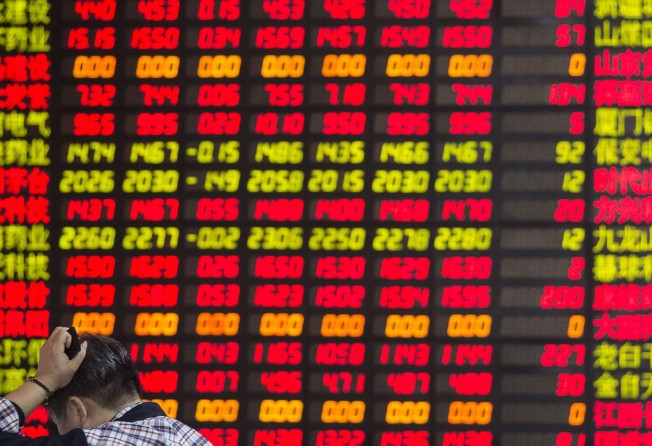Improving economic sentiment only short-term support for A-shares, analysts say
Chinese economic data for March beat expectations. Still any positive impact on equities may be short-lived.

Despite improved expectations over China’s economy for the coming quarters, analysts said the boost for equity markets may be short-lived.
China’s economic growth slowed to a 25-year low in 2015. Still, activity in March surprised to the upside as industrial output, fixed-asset investment, retail sales and credit data all beat market expectations.
Industrial production climbed 6.8 per cent year-on-year last month, above an estimated 5.5 per cent increase and up from 5.4 per cent in February. Fixed-asset investment in urban areas jumped 10.7 per cent, above the 10.2 per cent growth seen in the previous month.
“Conditions in the industrial and manufacturing sectors have gradually improved, “ Lian Ping, an analyst from Bank of Communications, said. “The entire economy has shown signs of stabilisation, or it is on the way towards stabilisation.”
Analysts at Citic Securities also said investors’ outlook is growing more positive.
“A notable pick-up in property and infrastructure investment has offset the weakness in investment into manufacturing due to the ongoing capacity elimination,” Citic analysts said in a recent research note.
The MNI China Business Sentiment Indicator, a privately-conducted poll of Chinese business executives at a mix of mainland-listed manufacturing and service sector companies, rose to 50.5 from 49.9 in March. Any measure over 50 is considered positive.
A-share markets also rebounded in March, as the benchmark Shanghai Composite Index gained 11.8 per cent to reverse two straight months of declines. As of Tuesday, the index had pulled back a little and was down 1.3 per cent in April.
Still, the positive impact on equity markets may be limited, Citic analysts said.
“Macro expectations only have a limited role to play in propping up the market,” they said. Expectations alone are unlikely to pull the market out of its current trough, they said.
Firstly, improving fundamentals usually mean less policy stimuli, Citic said.
The People’s Bank of China, the country’s central bank, has recently hinted they may have less appetite for policy stimuli. Ma Jun, chief economist for the PBOC’s research bureau, said last week that the bank will pay close attention to macroeconomic risks — such as a rapid increase in corporate debt — in its future policy operations, a report by state-owned Xinhua News Agency said.
“The yuan loan growth in the first quarter is indeed fairly fast,” Ma said.
New yuan loans were 1.37 trillion in March, compared with 726.6 billion yuan in February. Total social financing was 2.34 trillion yuan, significantly higher than 780.2 billion yuan in the month before.
“This could also be a precursor to a marginal tightening in monetary policy,” Citic said.
The PBOC has already started to drain liquidity recently on a net basis through open market operations. That points to “a subtle change in the policy bias” versus the previous accommodative policies, Citic analysts said.
They also anticipated uncertainties over “interbank liquidity” in April, as there are a great many wealth management products that are going to expire within the month.
“Banks may face mounting pressure to lock up deposits due to the falling rate of return for newly issued wealth management products, as investors re-invest redeemed principal,” they said.
Citic analysts said the strong recovery in China’s real estate market may not be sustained.
“Considering the purchasing restrictions in first-tier cities, we think property investment may
chill in the second half of 2016,” it said.
Investment goods are unlikely to stage a rebound in both volume and price in light of China’s “overcapacity elimination agenda”.
“In our view, expectations of improving economic fundamentals may drive a valuation re-rating, but only to a limited extent and for a brief period of time,” the Citic analysts said.
In terms of the views on the sector outlook, the firm cut its exposure to coal and petrochemicals, while increasing the weighting of the consumer-sector companies.
In Citic’s latest sector allocation, auto companies and banks account for 20 per cent each, while retailers, defence firms, oil and petrochemicals, liquor producers, husbandry companies, and pharmaceuticals take up 10 per cent respectively.
Their top stock picks included CNHTC Jinan Truck, Guangdong Eastone Century Technology, Beijing Aerospace Changfeng, Guangdong CHJ Industry, Industrial Bank and Kweichow Moutai.
Citic was bullish on large-cap blue-chip names, .
“The yield gap between small- and large-caps has not widened significantly since the start of April and hence we expect large-cap names to outperform small-caps in the near term,” the analysts said.